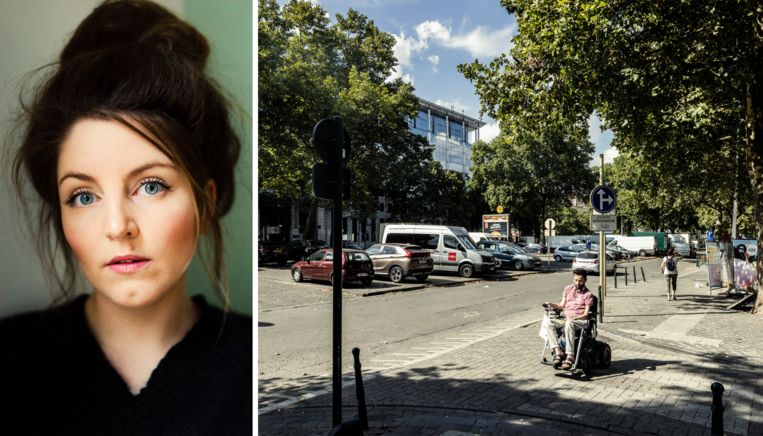Liz Speight is the author of the book I’m not here And the the morningColumn writer.
Highlights of the year: The day free central reservation parking is provided for the Brussels Little Ring between Anderlechtsepoort and Hallepoort in preparation for the Zuidfoor. After the last car wrecks were towed away, oil stains were sanded down and landfill waste removed, and a vast plain and stately boardwalk emerged, once built for recreation and relaxation after the city walls were demolished.
Anyone who has ever stood in a central reserve stripped of its parking lot will understand the wonderful feeling I am describing. It is a reunion. The space was there the whole time and suddenly you got to know each other again.
Unfortunately, the breathing room is short-lived, and the Furorers come immediately. As soon as the stalls leave for the next destination – as happened last week – the cars instantly reclaim the space. After years of illegal parking, they were given this right in 2015 by Els Ampe of Open Vld because very few other politicians saw a place in the fight for good space for residents from the poorest neighborhoods.
After returning from the parking lot, with little delay, illegal dumping follows, a petty crime that thrives under the guise of a stationary chassis. Thus the asphalt road for cycling and walking among the trees, which had been erected along the parking lot, was once again beyond the reach of the privileged citizen.
invisible
Chaos imposes power. My weakness turned into work when a nearby roof terrace gave me a top view of the mean strip, and I could count how many cars (rather, how many) were taking up the space. Carelessly parked in two wide rows, half a kilometer long, between Anderlechtsepoort and Lemonnier, two hundred cars narrowly reached. two hundred.
A large stretch of the boulevard, which could form a gentle transition between the old city center and the less green and more densely populated frontier neighborhoods, would be made available to a few car owners (locals but certainly also visitors who avoid the high-priced parking garages along the way). So many squares and streets in Brussels are wasted on idle steel, but this is the place that bothers me the most, as it drags such a large part of the city into the poverty of imagination. Like putting a storage closet in the middle of your living room.
Almost every day I pass by this place and imagine the groups of people who are currently being deprived of this space. Include them, kids who want to learn to ride a bike or run, neighborhood footballers, dog owners, domestic workers who like to walk, teens with volleyball ambitions, seniors who want to stretch their legs and meet on a bench under trees, cyclists and pedestrians who They want to move in a fun way. Together they number more than two hundred.
If these groups had to be disappointed one by one by politics (dear folks, get out of here, the money should be in the parking meters!), it would immediately show the bonding of their choice. Now the choice of this position is easy, because people with this decision do not complain loudly, they are invisible. The children are the ones who don’t play there. It’s the people who stay home because the space is so threatened and frustrating, and it’s the families who move because they can’t breathe here. It is not without reason that Cureghem, the part that limits this part of the loop, is a transit zone.
From paper to paper
Create a qualitative space in the city, for which the residents will be grateful. Look at the new park at Ninoofsepoort, a former no-man’s-land that is an extension of the same central reserve and for which civic movements have struggled. It has become everyone’s country – on fine days you can jump from picnic leaf to leaf. Nobody, except for the grumbling motorists who used this neighborhood only for traffic, wanted to go back to how it was before.
Of course, no one benefits from a hasty plan that does not listen to the diverse needs of the neighborhood. A budget for reconstruction will be provided only once in the coming decades. In anticipation of a solid solution, fair distribution, that will take years to come, there is currently only one voice being heard, and that is the voice of people wanting a storage closet in the middle of the room. Not making a decision also means choosing.
It’s best to imagine what a central parking-free reservation would result in during these two short moments, before and after the fair. Then my indignation is greater, because you see the potential is crushed. I hope that competent politicians, across all levels of government, will find the courage to make the central reservation (if necessary partially or sometimes) free of parking, so that locals and passers-by can begin to imagine the possibilities. Erase parking spaces frees up space for imagination.
““

“Total coffee specialist. Hardcore reader. Incurable music scholar. Web guru. Freelance troublemaker. Problem solver. Travel trailblazer.”







More Stories
GALA lacks a chapter on e-health
Weird beer can taste really good.
Planets contain much more water than previously thought